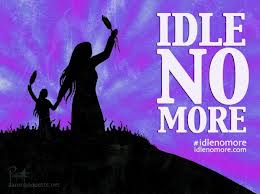Change the conversation, support rabble.ca today.
It is sometimes quipped that democracy is like two wolves and a lamb voting on dinner. This Darwinian image of vulnerable minorities falling prey to a “tyranny of the majority” is why few believe that democracy can be reduced to participation in elections. If democracy has value it is because it allows people to have a meaningful say in the rules that govern them. Anything that precludes or impairs this “voice” is anti-democratic by extension.
The Idle No More Indigenous rights movement is a democratic movement par excellence. It seeks to challenge those mechanisms of Canadian governance that preside over the lives of Indigenous peoples and in this sense their demand for self-government — what ancient Greek theorists called “autonomy,” from auto (self) and nomos (rule) — is a genuinely democratic aspiration. Canadians are coming to see this more clearly as the movement articulates its recommendations. (No surprise, then, that “Idle No More” was just voted ‘Best Democratic Moment of 2012‘ in a poll conducted by the research group on democracy, Samara.)
What exactly precludes and impairs the autonomy of Indigenous peoples? The Indian Act stands out as the most glaringly anti-democratic impediment to self-government. Not simply because it shatters the 60 or so original Indigenous nations along with their traditional governments and traditional territories into the 614 arbitrary “bands” now scattered across Canada on tiny “reserves,” but also because band leadership has no real say in political and legislative life on those reserves.
Although they are elected, Chief and Council have no democratic authority to govern because they are constrained from above by the Indian Act rather than below by their people. They are replaceable managers, in essence, not law-makers. Real authority resides in the enforcement of the Indian Act by Aboriginal Affairs and Northern Development Canada. The whole arrangement is insultingly arbitrary from a democratic perspective.
Thus, the Indian Act preserves only the barest semblance of Indigenous autonomy. And while no one denies that scrapping it is a necessary step, it is also clear that some substantive allowances for self-government need to be installed in its place if we are to keep the wolves at bay.
Why does the Indian Act need to be replaced rather than simply abandoned? It has to do with the fact that the anti-democratic “tyranny of the majority” problem requires that certain protections be written into our laws and Constitutions. The democratic autonomy of most Canadians — our ability to live freely as Canadians and have a say in the rules that govern us — is secured through the recognition of rights outlined in the Charter of Rights and Freedoms. Because Indigenous peoples are part of distinct nations, their right to live as Indigenous peoples is located not in the Charter but in Sec. 35(1) of the Canadian Constitution, which reads “The existing aboriginal and treaty rights of the aboriginal peoples of Canada are hereby recognized and affirmed.”
It is important that Canada recognize Aboriginal and treaty rights because they are needed to guard vulnerable communities and their lands against the obtuse majoritarian logic that motivates both electoral Canadian politics and the free market economy. It doesn’t take a political scientist to recognize that when governments or corporations do nothing more than add up the most prevalent private preferences of citizens the resulting policy is likely to be both blunt and ruthless. This is why scrapping the Indian Act is only a partial measure, one that is necessary for clearing space for democracy but does little to flesh out Sec. 35(1) in ways that secure that new space from circling wolves that are hungry for land and natural resources. (The Royal Commission Report on Aboriginal Peoples, published in 1996 and then shelved, has recommendations for executing this transition.)
A growing number of Canadians are awakening to the realization that the checks and balances entailed by Indigenous self-government would benefit Canadians as well, over and above the long overdue boost in democratic legitimacy that Canada would enjoy by finally acknowledging its Constitutional commitments.
When an aggregate majority of voters or consumers demands that a pit-mine be built on a native grave-site or that a lake full of fish be drowned in industrial effluent, self-governing Indigenous communities whose well-being depends on the sanctity and health of the land provide a crucial last line of defence. In this way, Indigenous governance serves the collective good of all Canadians rather than just the private preferences of individuals constituting an crude anti-democratic majority.
In rejecting the Indian Act and demanding a genuine form of democratic self-government protected from the lupine appetites of political and economic majorities, the Idle No More movement presents Canada with an opportunity to realize the promise of democracy enshrined in its own Constitution.



